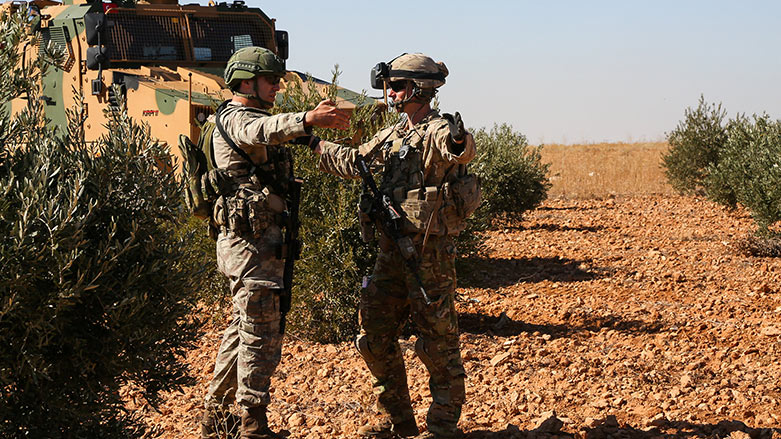US plans observer force for Northeast Syria

WASHINGTON DC (Kurdistan 24) – Acting US Secretary of Defense Patrick Shanahan revealed on Tuesday how Washington planned to address a key issue: secure the withdrawal of US forces from northeast Syria while ensuring that the people there, including America’s allies in the Kurdish-led Syrian Democratic Forces (SDF), are protected.
Washington looks to establish an “observer force” in the safe zone along the Turkish border that will be established with the withdrawal of US forces. Those observers will be from the coalition and not US troops, Shanahan told reporters, as he flew from Baghdad to Brussels for a two-day NATO meeting on February 13 and 14.
Since mid-December, when US President Donald Trump announced his surprise decision to withdraw US forces, the US military has focused on producing a plan that would allow for that withdrawal, but maintain stability in the area.
That includes ensuring the safety of America’s Kurdish allies, above all the People’s Protection Units (YPG), which Turkey considers a terrorist organization. It also includes protecting others living in that area, including Christians and Yezidis.
All of them fear that if Turkish forces, including their Free Syrian Army allies, which include jihadi elements, are allowed to control the safe zone, they will commit massacres and displace significant segments of the population.
“Kurds, Christian, and Yezidis in Northeast Syria are at grave risk of genocide,” the Washington-based NGO, Genocide Watch, warned last month, citing as precedent, Turkey’s assault last year on the Kurdish city of Afrin in northwestern Syria.
Various iterations of the plan that Shanahan discussed with journalists on Tuesday have been expressed unofficially in recent days, underscoring the thinking behind it.
On Saturday, Gen. Jack Keane (USA, Retired), former Vice-Chief of Staff of the US Army, advised Fox News that a hasty and ill-planned US withdrawal from Syria would lead to the quick re-emergence of the Islamic State, but that such a withdrawal could be carried out successfully, if done thoughtfully and if the US maintained “control of the airspace.”
Washington is “exploring the possibility of maintaining overall American control without US troops on the ground,” The Washington Post reported on Friday.
“Small contingents of British and French troops, who are already operating alongside Americans, would remain in the area with the SDF and perhaps also with private US military contractors and UN observers, while the United States provides air cover.”
“That is the outcome the Kurds say they would like most,” the Post reported.
And the day before that, on Thursday, Kurdistan 24 asked the State Department Deputy Spokesperson, Robert Palladino, “You remain committed to ensuring the security of the people that live in northeast Syria?”
“From the President on down,” he responded, “we have spoken at length to counterparts at various levels on how to proceed with the safe withdrawal of our troops, while stabilizing liberated areas” of Syria, “and we’re fully engaged on this.”
Palladino added, emphasizing the most sensitive issue—the continued safety of America’s Kurdish allies—“We’ve been clear that the Syrian Democratic Forces (SDF) should not be engaged militarily, and that would include the Kurdish component of the SDF.”
Shanahan’s exchange with journalists on Tuesday provides the most senior and authoritative statement on this issue: the US is not simply pulling out of Syria, but it is drawing up plans to ensure the protection of the Kurds, and all others, living in that area.
Shanahan also explained how important Syria is to him. “I track operations in Syria on a daily basis,” he said. “It’s one of the first things I do in the morning.”
Shanahan had also visited Afghanistan, where the US may also cut troops. But, he characterized Syria as “different” with regard to “the potential” there “to establish an observer force.”
Asked, “Are you saying that the safe zone/buffer zone along the Turkish border could include US troops as an enforcement mechanism?,” he replied, “I did not say that.”
“So it’s more coalition?” the reporter responded. “That’s what I said,” Shanahan answered. “That’s an important distinction.”
And that is an issue that Shanahan is discussing in Brussels at the NATO Defense Minister’s conference.
Editing by Nadia Riva
(Wladimir van Wilgenburg contributed to this report.)
